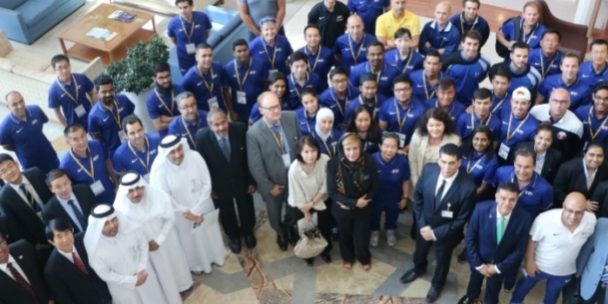DILI (14 June 2016) – More than 45 physiotherapists from across the continent gathered yesterday for the first-ever Asian Football Confederation (AFC) Sports Physiotherapy Course in Doha, Qatar.
Organised in partnership with Aspetar, one of the world’s leading orthopaedic and sports medicine hospitals, the three-day AFC Physiotherapy Course was conceived through the recommendation of the AFC Medical Committee, who acknowledged the invaluable role of physiotherapists in modern-day football.
From club to international football, youth to senior competitions, the Committee recognised that football was now being played with greater intensity and speed, exposing players to greater risk to injuries. In this context, the course has been designed to examine the role of today’s physiotherapists and the significant role they undertake in recovery and rehabilitation as players aspire to reach new peaks in performance.
Speaking at the course which opened on Monday in Doha, Qatar, Dato’ Dr Gurcharan Singh, Chairman of the AFC Medical Committee, said: “Our Member Associations are at the heart of everything we do. In partnership with Aspetar, this biennial course is designed for physiotherapists to enhance their clinical skills, update knowledge, share experiences and form a network of physical therapists to keep abreast with the latest developments.
“With the new AFC Vision and Mission, we are committed to establish robust systems to develop our sports science and medicine capabilities. The course brings together an international team of experts in Aspetar with the aim to ensure that the AFC’s physiotherapy capabilities are developed in line with the world’s best practices.”
Dr Mohamed Ghaith-Alkuwari, Director General of Aspetar, added: “This course is a milestone in our longstanding and successful partnership with the AFC. We are proud ourselves of the international expert team we have brought together at Aspetar, who attract some of the most elite athletes from all over the world. We trust this course will largely benefit Asian football.”
The three-day course designed by the AFC and Aspetar will not only present participants with the opportunity to examine the best practices in physiotherapy but also to further their knowledge through practical, evidence-based examples and extensive clinical research.
In total, some 29 speakers from Aspetar will share their expertise on a wide range of science and football medicine specialisations. In his opening address, Dr Scott Gillogy, Chief Medical Officer, Aspetar, said: “Having worked intensely with the AFC and our team to make this course happen, it is fantastic to finally see colleagues from all over Asia gathering in our unique facility, keen to learn from and with each other.”
Stressing the need to establish uniformity in the standards and sensibilities of physiotherapy, Dato’ Dr Gurcharan Singh added: “Keeping in mind the disparity in the levels of care and knowledge among physiotherapists in Asia, such educational programmes are essential in promoting ‘unity of doctrine’, as well as introducing ‘evidence-based medicine practices’ among the fraternity.
“It is important that participants disseminate information upon their return to the larger medical community.”







